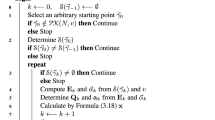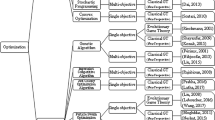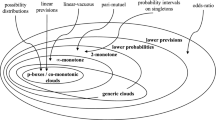Abstract
Harsanyi pointed out that “the player may lack full information about the other players’ (or even his own) payoffs, etc.” In this paper, we investigate the two-player zero-sum game, in which the payoffs are interpreted as fuzzy variables due to incomplete information. Based on the credibility theory, we employ three decision criteria to define the behaviors of the players in different decision situations. Accordingly, three definitions of Nash equilibria, called credibilistic equilibria, are proposed. Besides the existence theorem of the three credibilistic equilibria, we also discuss their relationships to illustrate the significance of the proposed credibilistic equilibria.
Similar content being viewed by others
References
Aubin JP (1981) Cooperative fuzzy games. Math Oper Res 6: 1–13
Borel E (1921) La theorie du jeu et les equations integrales a noyausymetrique[Translated as “The theory of play and integral equations with skew symmetric kernels”. Econometrica 21:97–100, 1953]. C R Hebd Seances Acad Sci 173:1304–1308
Borel E (1924) In: Hermann J (ed) Elements de la theorie des probabilities, 3rd edn [Translated as On games that involve chance and the skill of the players. Econometrica 21:101–115, 1953]. Librairie Scientifique, Paris, pp 204–221
Butnariu D (1978) Fuzzy games: a description of the concept. Fuzzy Sets Syst 1: 181–192
Campos L, Gonzalez A (1991) Fuzzy matrix games considering the criteria of the players. Kybernetes 20: 275–289
Gao J (2007) Credibilistic game with fuzzy information. J Uncertain Syst 1: 74–80
Gao J, Liu B (2005) Fuzzy multilevel programming with a hybrid intelligent algorithm. Comp Math Appl 49: 1539–1548
Gao J, Liu Z-Q (2007) Fuzzy-payoff two-player nonzero-sum games. Technical Report of City University of Hong Kong, Hong Kong
Gao J, Lu M (2005) Fuzzy quadratic minimum spanning tree problem. Appl Math Comput 164: 773–788
Harsanyi JC (1966) A general theory of rational behavior in game situations. Econometrica 34: 613–634
Harsanyi JC (1967) Games with incomplete information played by ‘Bayesian’ player, Part I. The basic model. Manage Sci 14: 159–182
Harsanyi JC (1995) Games with incomplete information. Am Econ Rev 85: 291–303
Kuhn HW (1950) Extensive games. Proc Natl Acad Sci USA 36: 570–576
Kuhn HW (1953) Extensive form games and the problem of information. Contrib Theory Games 2: 193–216
Liang R, Gao J (2008) Dependent-chance programming models for capital budgeting in fuzzy environments, vol 13, No. 1. Tsinghua Univesity and Technology
Liu B (2002) Theory and practice of uncertain programming. Physica-Verlag, Heidelberg
Liu B (2004) Uncertainty theory. Springer, Berlin
Liu Y (2005) Fuzzy programming with recourse. Int J Uncertain Fuzziness Knowl Based Syst 13: 381–413
Liu B (2006a) A survey of credibility theory. Fuzzy Optim Decis Making 5: 387–408
Liu Y (2006b) Convergent results about the use of fuzzy simulation in fuzzy optimization problems. IEEE Trans Fuzzy Syst 14: 295–304
Liu B (2007a) Uncertainty theory, 2nd edn. Springer, Berlin
Liu B (2007b) A survey of entropy of fuzzy variables. J Uncertain Syst 1: 1–10
Liu Y, Gao J (2007) The independence of fuzzy variables with applications to fuzzy random optimization. Int J Uncertain Fuzziness Knowl Based Syst 15(Suppl 2): 1–20
Liu B, Liu Y (2002) Expected value of fuzzy variable and fuzzy expected value models. IEEE Trans Fuzzy Syst 10: 445–450
Liu Y, Liu B (2003) Expected value operator of random fuzzy variable and random fuzzy expected value models. Int J Uncertain Fuzziness Knowl Based Syst 11: 195–215
Maeda T (2000) Characterization of the equilibrium strategy of the bimatrix game with fuzzy payoff. J Math Anal Appl 251: 885–896
Maeda T (2003) Characterization of the equilibrium strategy of the two-person zero-sum game with fuzzy payoff. Fuzzy Sets Syst 139: 283–296
Nash J (1950) Equilibrium points in n-person games. Proc Natl Acad Sci 36: 48–49
Nash J (1951) Non-cooperative games. Ann Math 54: 286–295
Nishizaki I, Sakawa M (2000) Equilibrium solutions for multiobjective bimatrix games with fuzzy payoffs and fuzzy goals. Fuzzy Sets Syst 111: 99–116
Nishizaki I, Sakawa M (2001) Fuzzy and multiobjective games for conflict resolution. Physica-Verleg, Heidelberg
Shapley L (1953) A value for n-person games. Contrib Theory Games 2: 307–317
Varoufakis, Y, Housego, A (eds) (2001) Game theory: critical concepts in the social sciences, vol I–IV. Routledge, London
von Neumann J (1928) Zur Theorie der Gesellschaftsspiele [Translated as On the theory of games of strategy. In: Tucker AW, Luce RD (eds) Contributions to the theory of games, vol IV. Princeton University Press, Princeton, pp 13–42, 1959]. Math Ann 100:295–320
von Neumann J, Morgenstern D (1944) The theory of games in economic behavior. Wiley, New York
Zhao R, Liu B (2003) Renewal process with fuzzy interarrival times and costs. Int J Uncertain Fuzziness Knowl based Syst 11: 573–586
Zhao R, Liu B (2004) Redundancy optimization problems with uncertainty of combining randomness and fuzziness. Eur J Oper Res 157: 716–735
Author information
Authors and Affiliations
Corresponding author
Rights and permissions
About this article
Cite this article
Gao, J., Liu, ZQ. & Shen, P. On characterization of credibilistic equilibria of fuzzy-payoff two-player zero-sum game. Soft Comput 13, 127–132 (2009). https://doi.org/10.1007/s00500-008-0310-3
Published:
Issue Date:
DOI: https://doi.org/10.1007/s00500-008-0310-3




